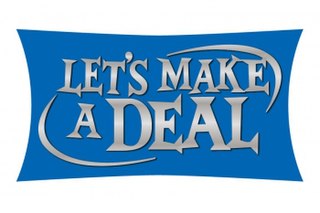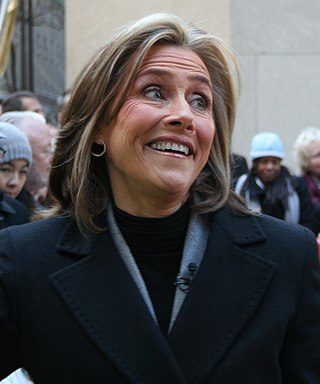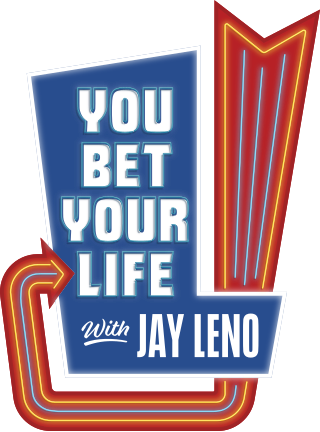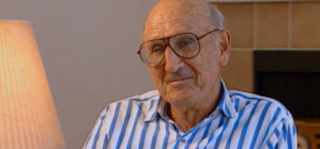
A game show is a genre of broadcast viewing entertainment where contestants compete in a game for rewards. The shows are typically directed by a host, who explains the rules of the program as well as commentating and narrating where necessary. The history of the game shows dates back to the late 1930s when both radio and television game shows were broadcast. The genre became popular in the United States in the 1950s, becoming a regular feature of daytime television.
Broadcast syndication is the practice of content owners leasing the right to broadcast their content to other television stations or radio stations, without having an official broadcast network to air it on. It is common in the United States where broadcast programming is scheduled by television networks with local independent affiliates. Syndication is less widespread in the rest of the world, as most countries have centralized networks or television stations without local affiliates. Shows can be syndicated internationally, although this is less common.

Monty Hall was a Canadian-American radio and television show host who moved to the United States in 1955 to pursue a career in broadcasting. After working as a radio newsreader and sportscaster, Hall returned to television in the U.S., this time in game shows. Starting in 1963, he was best known as the game show host and producer of Let's Make a Deal. He had a conundrum with game theory and psychology aspects named after him: the Monty Hall problem. Behind the scenes, Hall also carried on an active life of philanthropy.

Let's Make a Deal is a television game show that originated in the United States in 1963 and has since been produced in many countries throughout the world. The program was created and produced by Stefan Hatos and Monty Hall, the latter serving as its host for nearly 30 years.

Meredith Louise Vieira is an American broadcast journalist and television personality. She is best known as the original moderator of the daytime talk show The View (1997–2006), the original host of the syndicated daytime version of the game show Who Wants to Be a Millionaire (2002–2013), and as co-host of the NBC morning news program Today (2006–2011). As of 2019, she hosts the syndicated weekday game show 25 Words or Less.
To Tell the Truth is an American television panel show. Four celebrity panelists are presented with three contestants and must identify which is the "central character" whose unusual occupation or experience has been read aloud by the show's host. When the panelists question the contestants, the two impostors may lie whereas the "central character" must tell the truth. The setup adds the impostor element to the format of What's My Line? and I've Got a Secret.

Howard Michael Mandel is a Canadian comedian, television personality, actor, and producer. Mandel is known for voicing Gizmo in the 1984 film Gremlins and the 1990 sequel Gremlins 2: The New Batch, playing rowdy ER resident Dr. Wayne Fiscus on the NBC medical drama St. Elsewhere, and creating and starring in the Fox children's cartoon Bobby's World. He has also been a judge on NBC's America's Got Talent since 2010, and Citytv's Canada's Got Talent since 2022. He hosted the American NBC and later CNBC game show Deal or No Deal, as well as the show's daytime and Canadian-English counterparts.

Truth or Consequences was an American game show originally hosted on NBC radio by Ralph Edwards (1940–57) and later on television by Edwards (1950–54), Jack Bailey (1954–56), Bob Barker (1956–75), Steve Dunne (1957–58), Bob Hilton (1977–78) and Larry Anderson (1987–88). The television show ran on CBS, NBC and also in syndication. The premise of the show was to mix the original quiz element of game shows with wacky stunts.

You Bet Your Life is an American comedy quiz series that has aired on both radio and television. The original version was hosted by Groucho Marx of the Marx Brothers, with announcer and sidekick George Fenneman. The show debuted on ABC Radio on October 27, 1947, moved to CBS Radio debuting October 5, 1949, and went to NBC-TV and NBC Radio on October 4, 1950. Because of its simple format, it was possible to broadcast the show on both radio and television but not simultaneously. Many of the laughs on the television show were evoked by Groucho's facial reactions and other visual gimmicks. So the two versions were slightly different. The last episode in a radio format aired on June 10, 1960. The series continued on television for another year, recording the last season, beginning on September 22, 1960, with a new title, The Groucho Show.

Columbia Pictures Television, Inc. was launched on May 6, 1974, by Columbia Pictures as an American television production and distribution studio. It is the second name of the Columbia Pictures television division Screen Gems (SG) and the third name of Pioneer Telefilms. The company was active from 1974 until New Year's Day 2001, when it was folded into Columbia TriStar Television, a merger between Columbia Pictures Television and TriStar Television. A separate entity of CPT continues to exist on paper as an intellectual property holder, and under the moniker "CPT Holdings" to hold the copyright for the TV show The Young and the Restless, as well as old incarnations from the company's television library such as What's Happening!!

Fred Silverman was an American television executive and producer. He worked as an executive at all of the Big Three television networks, and was responsible for bringing to television such programs as Scooby-Doo, Where Are You!, All in the Family (1971–1979), The Waltons (1972–1981), and Charlie's Angels (1976–1981), as well as the miniseries Rich Man, Poor Man (1976), Roots (1977), and Shōgun (1980). For his success in programming such successful shows, Time magazine declared him "The Man with the Golden Gut" in 1977.

Winston Conrad "Wink" Martindale is an American disc jockey, radio personality, game show host, and television producer. He is best known for hosting Gambit from 1972 to 1976, Tic-Tac-Dough from 1978 to 1985, High Rollers from 1987 to 1988, and Debt from 1996 to 1998.

Jim Perry was an American-Canadian television game show host, singer, announcer, and performer in the 1970s and 1980s.

Bob Stewart was an American television game show producer. He was active in the TV industry from 1956 until his retirement in 1991.

Daytime television is the general term for television programs produced for broadcast during the daytime hours on weekdays; programs broadcast in the daypart historically have been programmed to appeal to a female audience.

The Price Is Right is an American game show produced by Mark Goodson-Bill Todman Productions, wherein contestants placed successive bids on merchandise prizes with the goal of bidding closest to each prize's actual retail price without surpassing it. The show was a precursor to the current and best-known version of the program, which premiered in 1972 on CBS's daytime schedule. It makes The Price Is Right one of only a few game show franchises to have aired in some form across all three of the Big Three television networks.

Weakest Link is an American television game show that made its debut in 2001. It is an adaptation of the British television series of the same name.
Barry & Enright Productions was a United States television production company that was formed in 1947 by Jack Barry and Dan Enright.
Stefan Hatos-Monty Hall Productions is a television production company responsible for producing several American game shows in the 1970s and 1980s. The company is best known for its hit series Let's Make a Deal, which aired in several company-produced iterations off and on between 1963 and 1986.

Wheel of Fortune is an American television game show created by Merv Griffin. The show has aired continuously since January 6, 1975. Contestants solve word puzzles, similar to those in hangman, to win cash and prizes determined by spinning a giant carnival wheel. The current version of the series, which airs in nightly syndication, premiered on September 19, 1983.















